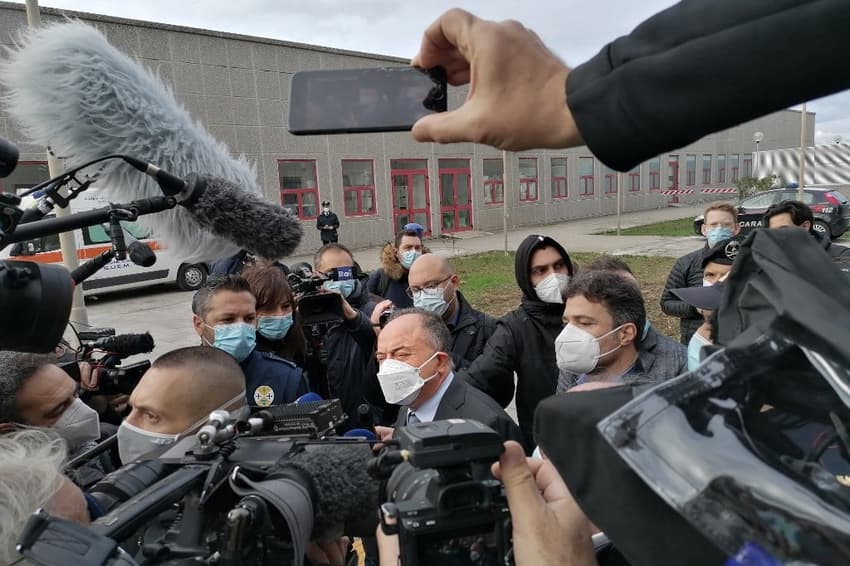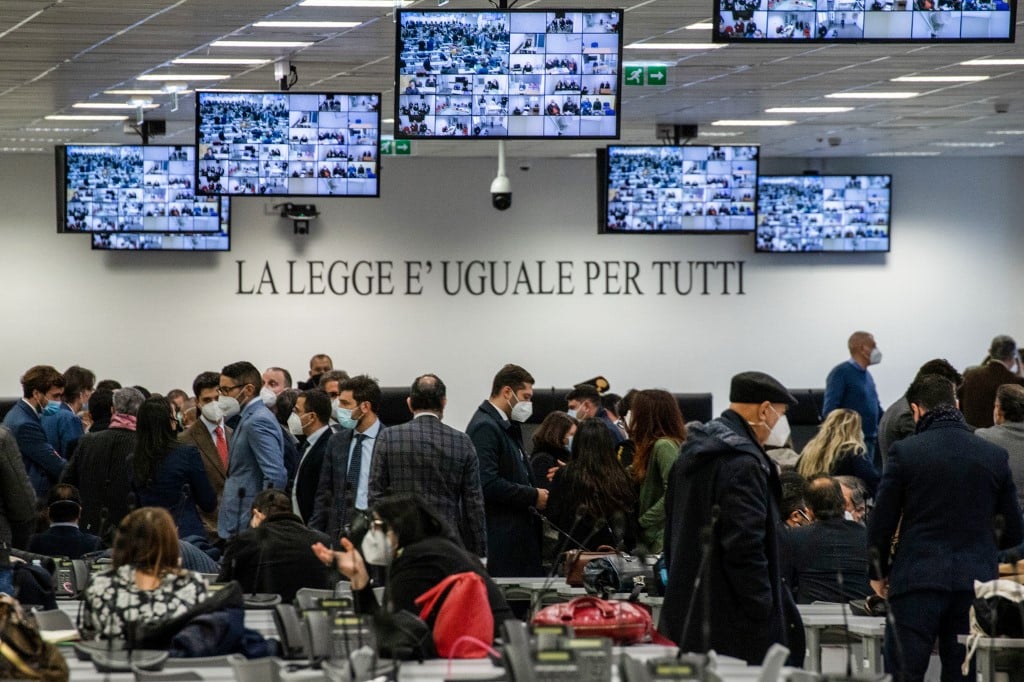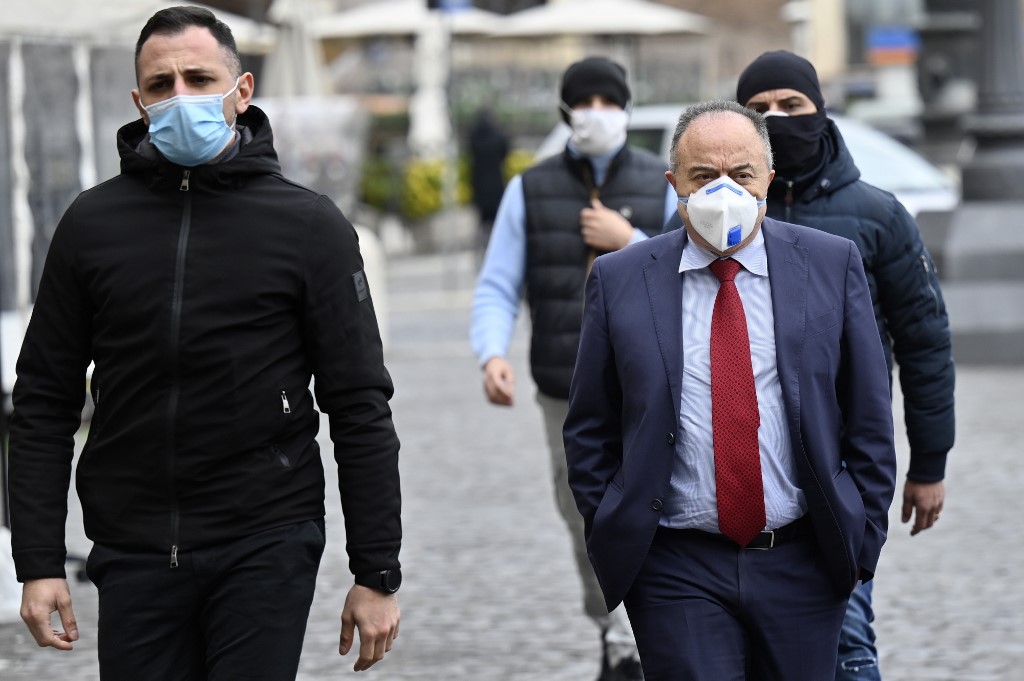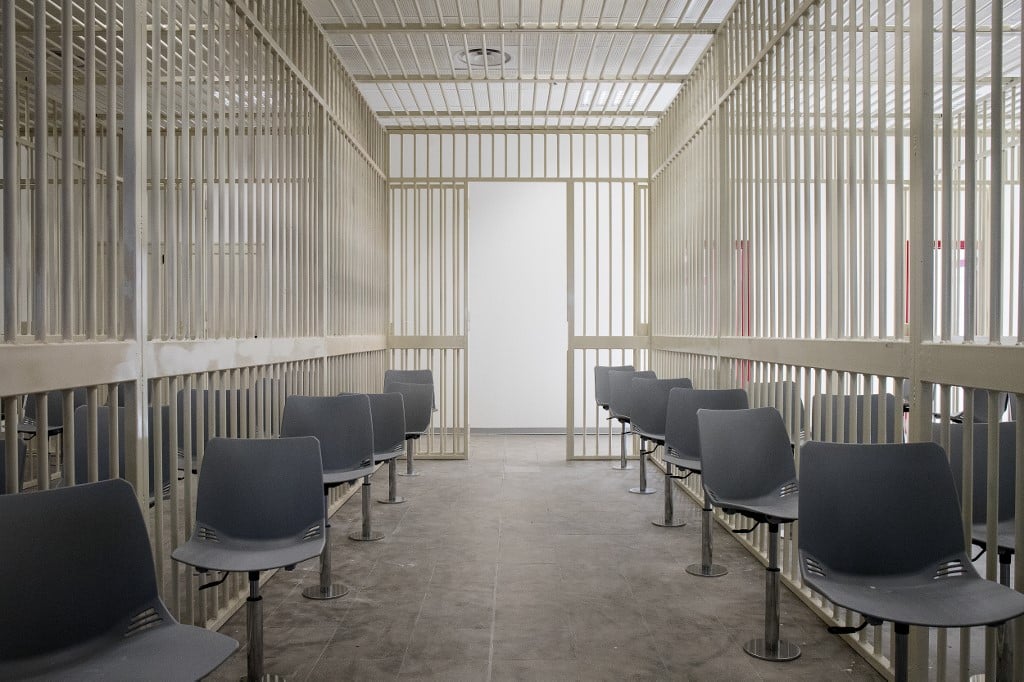'Ndrangheta: Major Italian mafia 'maxi-trial' kicks off with over 350 defendants

Italy's largest mafia trial in more than 30 years begins on Wednesday, as prosecutors hope to strike a blow to the 'Ndrangheta crime syndicate
More than 350 alleged members of the mafia and the politicians, lawyers, businessmen and others accused of enabling them face a judge in a huge, specially converted courtroom in the southern Calabrian town of Lamezia Terme, in the heart of 'Ndrangheta territory.
READ ALSO: Meet Nicola Gratteri, the prosecutor leading Italy's battle against the mafia
With over 900 prosecution witnesses and 400 lawyers, the trial also features an unprecedented 58 state witnesses ready to break their code of silence and expose the clan's long-buried secrets.
Held inside a specially outfitted building in the heart of 'Ndrangheta territory in Calabria, Italy's poorest region, the trial beginning Wednesday targets just one group, the Mancuso family and its affiliates.

Photo: AFP
During a recent hearing, it took three hours just to read the names of the defendants, which include boss Luigi Mancuso, "The Uncle" - who has previously spent nearly 20 years in prison - and dozens of others with nicknames like "The Wolf", "Fatty", "Sweetie", "Blondie", "Little Goat", and "The Wringer".
Prosecutors are seeking to prove a web of crimes dating back to the 1990s,both bloody and white-collar, including murder, drug trafficking, extortion,
money laundering and abuse of office.
The trial "is a cornerstone in the building of a wall against the mafias in Italy", anti-mob prosecutor Nicola Gratteri told AFP.
He later sat in the front row of the courtroom as Judge Tiziana Macri began reading out the names of the defendants, none of whom attended in person but
who participated via video conference, their faces shown on dozens of televisions fitted over lines of grey desks.
With so many defendants on video link from their jails, Italy's biggest mafia trial in 30 yrs is looking like the world's biggest mob Zoom pic.twitter.com/cLgCUmzMJ1
— Tom Kington (@tomkington) January 13, 2021
In Italy, so-called "maxi-trials," which include scores of defendants and countless charges, are seen as the best judicial resource against the country's various organised crime groups, of which the 'Ndrangheta is now considered the most powerful, controlling the bulk of cocaine flowing into Europe.
Maxi-trials are controversial, given the need to give each suspect a fair hearing.Prosecutors argue the 'Ndrangheta's extensive operations mean crimes cannot be easily separated and prosecuted piecemeal.
The most famous "maxi-trial" of 1986-7 dealt a major blow to Sicily's Cosa Nostra, resulting in 338 guilty verdicts, but prosecutors Giovanni Falcone and Paolo Borsellino were later assassinated.
READ ALSO: The life and death of Sicilian anti-mafia judge Paolo Borsellino

Catanzaro's public prosecutor Nicola Gratteri (R) has lived under police protection for 30 years. Photo: AFP
The upcoming trial differs partly because its scope is more limited, targeting one of the estimated hundreds of 'Ndrangheta families whose tentacles spread globally.
The number of accused swells to over 400 when including the more than 90 defendants who opted for speedy trials.The current trial, expected to last at least a year and likely longer, features 355 defendants, more than 900 prosecution witnesses, and an unprecedented number of collaborators, given the close family ties within the 'Ndrangheta that discourage turncoats.
The 'Ndrangheta has expanded well beyond its traditional domains of drug trafficking and loan sharking, now using shell companies and frontmen to
reinvest illegal gains in the legitimate economy.
In many parts of Calabria, it has infiltrated practically all areas of public life, from city hall and hospitals, to cemeteries and even the courts,
experts say.
'Like a multinational'
Authorities believe there are some 150 'Ndrangheta families in Calabria and at least 6,000 members and affiliates in the region. That swells to thousands more when including those worldwide, although estimates are unreliable.
The organised crime group generates more than 50 billion euros ($61 billion) per year, according to Gratteri, who called it the world's richest such organisation.
The prosecutor explained the 'Ndrangheta as a network of families, each of which wield power over subordinates.
"I have to start with the idea that there's an organisation, as in a business, as in a large multinational, with a boss and then down, like a pyramid, to all the other members," Gratteri told AFP, explaining the need for the "maxi-trial".
The current trial focuses on just one family, the Mancuso group, and its network of associates who control the Vibo Valentia area of Calabria.
READ ALSO: 'Ndrangheta: It's time to bust some myths about the Calabrian mafia
A holding cell for defendants at the upcoming maxi-trial. Photo: Gianluca Chininea/AFP
The town of Lamezia Terme, where the trial will take place, was cited in a 2008 parliamentary organised crime report as a public safety emergency zone where the region's "greatest increase in serious bloodshed has been recorded".
Defendants include a high number of non-clan members, including an ex-parliamentarian, a high-ranking police official, mayors and other public
servants and businessmen.
Criminologist Federico Varese of Oxford University said the trial reflects the wide-reaching control of the 'Ndrangheta, who are embedded in the
community and involved in every legal and illicit activity.
"This trial shows how deeply rooted the 'Ndrangheta is in society."
"The real strength of these mafia families is they have control of the territory and within the territory they do everything," said Varese. "If you want to open a shop, if you want to build anything, you have to go through them."
"They are the authority."
Comments
See Also
More than 350 alleged members of the mafia and the politicians, lawyers, businessmen and others accused of enabling them face a judge in a huge, specially converted courtroom in the southern Calabrian town of Lamezia Terme, in the heart of 'Ndrangheta territory.
READ ALSO: Meet Nicola Gratteri, the prosecutor leading Italy's battle against the mafia
With over 900 prosecution witnesses and 400 lawyers, the trial also features an unprecedented 58 state witnesses ready to break their code of silence and expose the clan's long-buried secrets.
Held inside a specially outfitted building in the heart of 'Ndrangheta territory in Calabria, Italy's poorest region, the trial beginning Wednesday targets just one group, the Mancuso family and its affiliates.

Photo: AFP
During a recent hearing, it took three hours just to read the names of the defendants, which include boss Luigi Mancuso, "The Uncle" - who has previously spent nearly 20 years in prison - and dozens of others with nicknames like "The Wolf", "Fatty", "Sweetie", "Blondie", "Little Goat", and "The Wringer".
Prosecutors are seeking to prove a web of crimes dating back to the 1990s,both bloody and white-collar, including murder, drug trafficking, extortion,
money laundering and abuse of office.
The trial "is a cornerstone in the building of a wall against the mafias in Italy", anti-mob prosecutor Nicola Gratteri told AFP.
With so many defendants on video link from their jails, Italy's biggest mafia trial in 30 yrs is looking like the world's biggest mob Zoom pic.twitter.com/cLgCUmzMJ1
— Tom Kington (@tomkington) January 13, 2021
Maxi-trials are controversial, given the need to give each suspect a fair hearing.Prosecutors argue the 'Ndrangheta's extensive operations mean crimes cannot be easily separated and prosecuted piecemeal.
The most famous "maxi-trial" of 1986-7 dealt a major blow to Sicily's Cosa Nostra, resulting in 338 guilty verdicts, but prosecutors Giovanni Falcone and Paolo Borsellino were later assassinated.
READ ALSO: The life and death of Sicilian anti-mafia judge Paolo Borsellino

Catanzaro's public prosecutor Nicola Gratteri (R) has lived under police protection for 30 years. Photo: AFP
The upcoming trial differs partly because its scope is more limited, targeting one of the estimated hundreds of 'Ndrangheta families whose tentacles spread globally.
The number of accused swells to over 400 when including the more than 90 defendants who opted for speedy trials.The current trial, expected to last at least a year and likely longer, features 355 defendants, more than 900 prosecution witnesses, and an unprecedented number of collaborators, given the close family ties within the 'Ndrangheta that discourage turncoats.
The 'Ndrangheta has expanded well beyond its traditional domains of drug trafficking and loan sharking, now using shell companies and frontmen to
reinvest illegal gains in the legitimate economy.
In many parts of Calabria, it has infiltrated practically all areas of public life, from city hall and hospitals, to cemeteries and even the courts,
experts say.
'Like a multinational'
Authorities believe there are some 150 'Ndrangheta families in Calabria and at least 6,000 members and affiliates in the region. That swells to thousands more when including those worldwide, although estimates are unreliable.
The organised crime group generates more than 50 billion euros ($61 billion) per year, according to Gratteri, who called it the world's richest such organisation.
The prosecutor explained the 'Ndrangheta as a network of families, each of which wield power over subordinates.
"I have to start with the idea that there's an organisation, as in a business, as in a large multinational, with a boss and then down, like a pyramid, to all the other members," Gratteri told AFP, explaining the need for the "maxi-trial".
The current trial focuses on just one family, the Mancuso group, and its network of associates who control the Vibo Valentia area of Calabria.
READ ALSO: 'Ndrangheta: It's time to bust some myths about the Calabrian mafia
A holding cell for defendants at the upcoming maxi-trial. Photo: Gianluca Chininea/AFP
The town of Lamezia Terme, where the trial will take place, was cited in a 2008 parliamentary organised crime report as a public safety emergency zone where the region's "greatest increase in serious bloodshed has been recorded".
Defendants include a high number of non-clan members, including an ex-parliamentarian, a high-ranking police official, mayors and other public
servants and businessmen.
Criminologist Federico Varese of Oxford University said the trial reflects the wide-reaching control of the 'Ndrangheta, who are embedded in the
community and involved in every legal and illicit activity.
"This trial shows how deeply rooted the 'Ndrangheta is in society."
"The real strength of these mafia families is they have control of the territory and within the territory they do everything," said Varese. "If you want to open a shop, if you want to build anything, you have to go through them."
"They are the authority."
Join the conversation in our comments section below. Share your own views and experience and if you have a question or suggestion for our journalists then email us at [email protected].
Please keep comments civil, constructive and on topic – and make sure to read our terms of use before getting involved.
Please log in here to leave a comment.